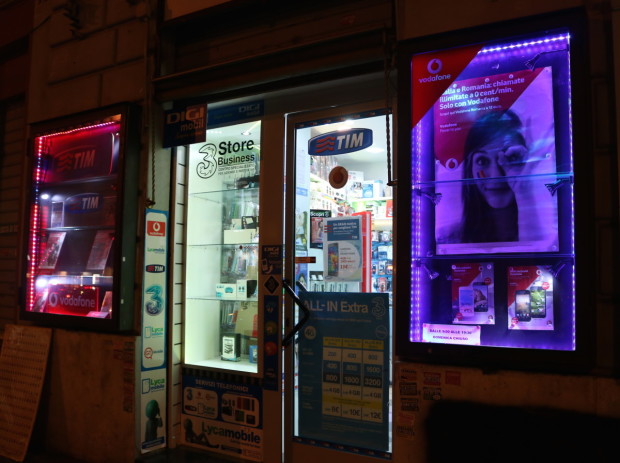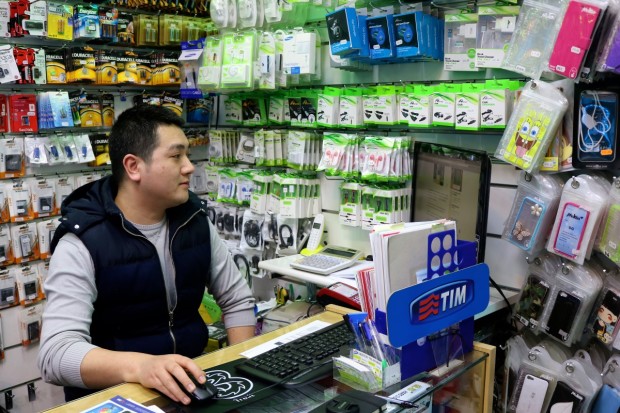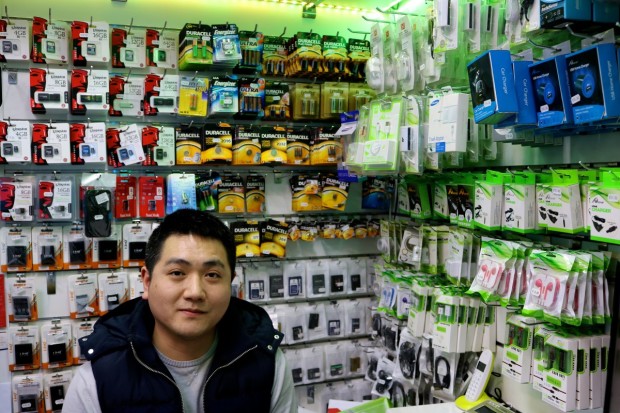
This tiny telephone services store on Via Delle Fornaci is just across the street from Vatican City.
ROME – Pilgrims and tourists come in and out of the tiny telephone services store on Via Delle Fornaci, just across the street from Vatican City, every day. Many of them buy SIM cards, routers and electric converters to keep their phone cameras charged while photographing the frequent papal appearances just 100 yards away at St. Peter’s Square, the spiritual home of Catholicism.
But the man who has operated the telephone shop for the last six years, Xiaohai Zhang, has never been to a papal mass. “Faith for me does not have much to do with the environment,” said Zhang. “I mostly practice on my own but sometimes I go to the Chinese Christian Association near Piazza Vittorio.”

Xiaohai Zhang, 32, is originally from Wenzhou, Zhejiang Province. He is one of the approximately 320,000 Chinese citizens currently residing in Italy, according to the Italian National Institute of Statistics.
Zhang, who is 32 and originally from Wenzhou, Zhejiang Province, is one of the approximately 320,000 Chinese citizens residing in Italy, according to the Italian National Institute of Statistics. Nearly 40 percent of them are non-religious, 38 percent subscribe to Chinese folk religions, 14 percent are Buddhists and only 8 percent are Christians. Zhang himself joined a Christian church in Wenzhou even before coming to Italy.
Like Zhang, most of these immigrants open retail and wholesale businesses in their adopted country, which is very much in line with the Wenzhou people’s entrepreneurial reputation. But making a new life in a foreign country is never easy. While Zhang considered himself lucky enough to open up this little shop with a friend, many Chinese workers have been toiling away as cheap laborers in Italy’s garment factories.
It is a slow business season now at Zhang’s store, Servizi Telefonici. Only one or two customers step inside every 10 to 20 minutes. Occasionally, they hesitate – seeing a young Chinese man sitting behind the counter – before asking for an Italian SIM card, a converter or Wi-Fi router. But Zhang doesn’t mind. After 14 years in Italy, he has learned the Italian way of taking things easy. It was only because he’s in a touristy area that he can’t take siestas. It has been hard integrating into the Italian society but Zhang prefers to stay in Italy for the long-term. His fluent Italian often quickly brushes away any doubts about his identity as a permanent resident of Italy.

Xiaohai Zhang takes turns with his partner to work in their telephone services store.
“I couldn’t speak a word of Italian for the first three years that I was here,” said the soft-spoken Zhang. “But after I became fluent in Italian in my sixth year, I began to feel the freedom I have in this country.”
Zhang happened upon the little store on Via Delle Fornaci soon after he arrived in Italy in 2010. The landlord was asking 2,000 euros a month in rent. A lover of technology, Zhang allowed himself to dream of opening a shop. The location, across the street from Vatican City, made it seem like this idea could succeed. Sometimes he feels like maybe it was all meant to be.
Zhang lives in the Tuscolana area, a 30-minute drive away from his shop.
And he worships at a Catholic church in Piazza Vittorio, at the heart of Esquilino in Rome. Over the past decade the area has become a predominantly Chinese neighborhood. Visible storefront signs in Chinese characters stretch throughout the streets.
Zhang came to Italy in 2002 with the help of his mother, who smuggled herself into the country decades earlier. When Italy granted amnesty for illegal immigrants including Zhang’s mother in 1998, he was able to acquire a permanent resident card through her and make his way here.
Zhang said that he, like most Chinese in Italy, focus more on making a living than on politics in Italy or around the world. That has enabled many to succeed but it comes at a price. “Chinese people love to do business instead of politics, that’s why we don’t have a say in many things happening here.”